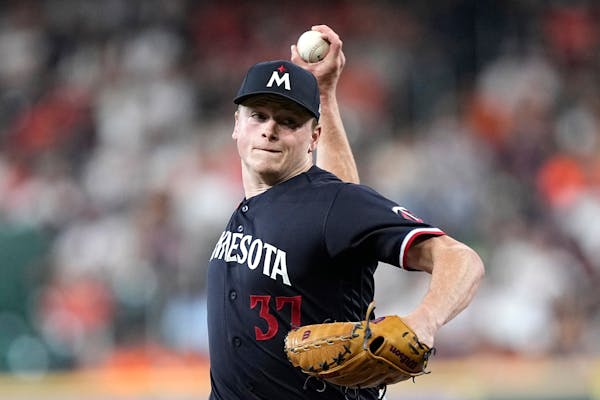HOUSTON — A federal bankruptcy judge could rule Thursday or Friday about whether Bally Sports North's parent company must pay the Twins the full amount of their broadcast-rights deal for this season, a payday believed to be worth more than $40 million.
But even if Diamond Sports Group, which owns BSN and 18 other regional sports networks under the Bally's brand, relinquishes those rights and stops airing Twins games, the team, with a franchise-record player payroll of more than $150 million, won't lose a season's worth of critical revenues.
Major League Baseball is prepared to subsidize teams abandoned in Diamond Sports' bankruptcy as much as 80% of what they were supposed to receive, Commissioner Rob Manfred revealed during more than two hours of sometimes-contentious testimony in Federal Bankruptcy Court in Houston on Wednesday.
"In order to help our clubs, we said to them, no matter what happens, we'll backstop you at 80 percent of what you expected," Manfred revealed. "We wanted them to have enough cash flow to prevent a disruption of our business."
Manfred testified in support of a federal suit filed by the Twins, Guardians, Diamondbacks and Rangers against Diamond Sports after the bankrupt company skipped a quarterly payment earlier this season. The court later ordered Diamond Sports to come up with 75% of that initial payment, but the broadcaster will soon owe another full payment to those teams.
In a separate case, Bally Sports San Diego chose not to pay the Padres this week, and MLB took over broadcasting Padres games on alternate channels Wednesday night. That could be the fate of the Twins, too, if the network terminates a contract with the team that it says loses money. Their next payment is due July 1, so changes to the Twins' TV carrier would be made in the next month.
Diamond Sports has asked federal bankruptcy judge Christopher Lopez to rule that their contracts with the four teams no longer reflect "fair market value" due to the loss of subscribers — as much as 50% over the past decade, the networks say — to cord-cutting. But Manfred scoffed at that notion, asserting that regional sports networks raked in profits of "hundreds and hundreds of millions" in previous seasons.
"If you say in one year of a deal, well, we're losing money, that ignores that over the course of the agreement, there are ebbs and flows," Manfred said during cross-examination. "Profit margins were [previously] well in excess of 20 percent. Our view is that fair market value is still equal or above [what teams are owed]."
Subscriptions to Bally Sports North have declined 37% over the past decade, Diamond Sports said, while their rights payments have risen by 62% in that time. The Twins' contract with BSN expires at the end of the season, and the team is seeking a new broadcasting partner starting next season.
Diamond Sports has offered to make full payments if MLB grants them the right to stream games to non-customers, called direct-to-consumer (DTC) rights, for no additional fee. With that offer, argued Twins attorney Jim Bromley, "they want to, in effect, blackmail MLB and the four teams for their DTC rights."
Manfred ridiculed that proposal, too, pointing out that Bally owns the DTC rights to Rays, Tigers, Royals, Brewers and Marlins games, "and we extracted fair market value for those rights."
Diamond Sports chief executive officer David Preschlack testified that the company, which filed for bankruptcy in February, projects that the networks could sell 800,000 digital subscriptions to MLB, NBA and NHL games by the end of this year, and 10 million annually by 2028.
Once Lopez rules over whether Diamond Sports has to pay the full amount of its contract, under bankruptcy law the company can decide whether to terminate the contract completely. As with the Padres, Manfred has committed MLB to broadcasting Twins games itself if necessary.
Baseball has had "an uneasy relationship" with Diamond Sports and its parent company, Sinclair Broadcasting, ever since they purchased the networks from Disney Corp. for $10.5 billion in 2019, an overpayment that is largely responsible for the networks' bankruptcy. "They were talking about gambling, ticketing, merchandising, rights they didn't have. … We got a lot of complaints from clubs," Manfred testified.
Finally, Sinclair chairman David Smith came to his New York office and demanded concessions that Manfred said he refused.
"He said, 'I'm going to squeeze your clubs. I'm going to put [Diamond Sports] into bankruptcy and then selectively [terminate] contracts," the commissioner recalled. "It ended badly. He wasn't happy and neither was I. [To] say we're going to squeeze you on rights fees, it didn't sit well with us."

Talking Preps: New Maple Grove football coach fulfills a long-time dream


